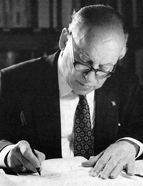

However, he found another outlet for his work as a professor at the Universidade Livre, created in 1977, the first private higher education institution established after the 25 April revolution. He was one of its founders, alongside other teachers who had been removed from public education, where he became head of the History Department and taught various subjects. It was during his years away from public education that he began to draw up plans for a History of Portugal. In 1977, the first volume was published with the subtitle State, Homeland and Nation – the values he had always believed in and defended.
Meanwhile, he resumed teaching in the 1979-1980 academic year, leading a seminar dedicated to “Portuguese Regional Areas”. Upon learning that polytechnic education was being introduced in the country, he expressed his desire to collaborate in what would be created in Santarém and was invited by Vítor Crespo, Minister of Education, to chair the respective installation committee. He then nurtured the project of creating university education alongside the polytechnic, which would be the embryo of a University of Ribatejo. However, profound differences with Professor José Augusto Seabra, Minister of Education, led to his dismissal from the presidency of the Polytechnic Institute in 1984. He then returned to the teaching staff of the Faculdade de Letras [School of Arts and Humanities]on a full-time basis in October 1985, where he remained for ten years of uninterrupted activity. This was the last phase of his career as a professor, during which he devoted himself entirely to teaching, without ever ceasing to write and publish. In the undergraduate programme, he taught courses on the History of Portuguese Discoveries, History of Brazil, Numismatics, Modern History of Portugal and Introduction to History. At the same time, he was involved in postgraduate studies, supervising master’s and doctoral projects.
This work is financed by national funds through FCT - Foundation for Science and Technology, I.P, in the scope of the projects UIDB/04311/2020 and UIDP/04311/2020.
